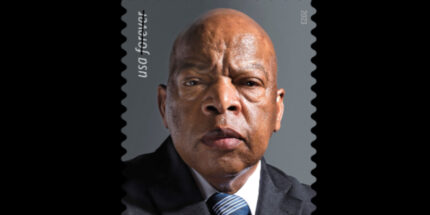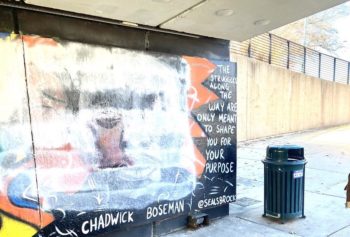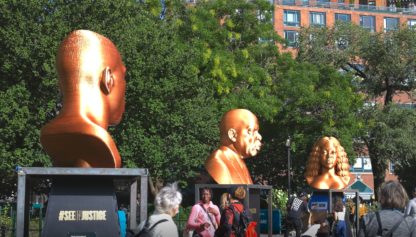While members of Congress marked the 50th anniversary of the March on Washington,in the chambers of the Capitol, Chinese sculptor Lei Yixin was removing a phrase on the Martin Luther King Jr. memorial that had drawn controversy because luminaries like writer Maya Angelou thought the paraphrase didn’t portray King in the proper light.
The offending phrase on the sculpture came from King’s “Drum Major Instinct” sermon and it read, “I was a drum major for justice, peace and righteousness.”
The quotation drew criticism from many, including famed poet Angelou, because they believed it changed the true nature of King’s meaning.
The actual quotation, from a sermon King delivered at Ebenezer Baptist Church in Atlanta two months before his April 1968 assassination, was the following: “Yes, if you want to say that I was a drum major, say that I was a drum major for justice. Say that I was a drum major for peace. I was a drum major for righteousness. And all of the other shallow things will not matter.”
Lei started working on Monday, carving grooves over the area where the phrase sat to match existing horizontal striations in the statute, according to National Park Service officials.
“He feels that it was an honor to work with the M.L.K. Foundation to make the memorial,” the sculptor said through his son, Shi Ke, who was intepreting for him. “He has put a lot of effort and heart into the statue. He thinks that Americans would not regret to pick him as the sculptor.”
Through his translator, Lei said that he knew of King, even in China.
In the congressional ceremony, Senate Majority Leader Harry Reid (D-Nevada) warned that the civil rights that the march helped to protect and secure for disenfranchised Americans are “once again under siege.”
House and Senate leaders from both parties gathered in the stately Statuary Hall to commemorate the 1963 March on Washington for Jobs and Freedom, which is credited with applying pressure on Congress to pass the Civil Rights and Voting Rights acts that won passage in 1964 and 1965.
Reid pointed out that after the Supreme Court’s June decision invalidating a key part of the Voting Rights Act, several states such as Texas and North Carolina moved quickly to implement voting rules that he considers a threat to the votes of minorities, the elderly, women and others.
“Fifty years later, some of the progress made by the civil rights movement, and some of the protections made by the Voting Rights Act, are once again under siege,” Reid said. He urged those who value the movement’s key victories to “take this assault on freedom as seriously as you’ve taken anything.”
Reid’s comments drew the applause of such leaders as Nancy Pelosi, D-Calif., who sat onstage alongside Rep. John Lewis, D-Ga. Lewis is the congressional member most closely linked to the Civil Rights Movement because as a student activist he endured a severe beating in the 1965 “Bloody Sunday” voting rights march in Selma, Ala.
While Reid spoke, House Speaker John Boehner, R-Ohio, and Senate Minority Leader Mitch McConnell, R-Ky., did not applaud. In fact, Boehner turned to McConnell with a questioning glance during the applause.
Boehner also gave remarks, making references to everyone from Abraham Lincoln to Frederick Douglass to King.
“This is a story of how a president, a slave, a seamstress and a minister locked arms across a period of time. A story that shakes us forward and shakes us free,” Boehner said.
The crowd was roused by legendary opera singer Jessye Norman’s rendition of “He’s Got the Whole World In His Hands.”
Civil rights leaders are planning two major events to commemorate the 50th anniversary of the march: An Aug. 24 march from the Martin Luther King Jr. Memorial to the Lincoln Memorial, and an Aug. 28 march that will stop at the Labor Department and the Justice Department buildings.


